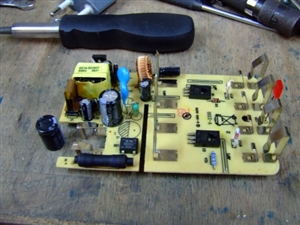To start thing off I have attached a couple of pictures of recent repairs I have made. Did it make sense to make these repairs? I think so.


Best regards
Roger


I was talking to a university professor who informed me that most engineering hobbyists usually have very little advantage over non-hobbyists in electronic engineering degree courses. It’s something to do with the style of learning and assessment required for success in exams and assessments. He even admitted that many engineering hobbyists would be better off taking a more avocational course rather than an engineering degree.
I often wonder ... well, perhaps worry ... about this, as it does mirror my own experience, including some things being taught on the degree I did being very distant from how it's done in the real world (and on occasion, perhaps wrong).
This leads to the following thoughts (simplified summary, definitely "generalisation" in its grossest form, each point debatable and of course individuals may fall between the cracks of this):
Graham Kenyon:
I often wonder ... well, perhaps worry ... about this, as it does mirror my own experience, including some things being taught on the degree I did being very distant from how it's done in the real world (and on occasion, perhaps wrong).
I think that it is safe to say with confidence that university professors in mathematics and physics are the best brains in the world in their subjects, but it is questionable whether university professors in engineering are the best brains in their subject because they are rarely party to cutting edge developments in industry. Even in industrial projects carried out in conjunction with professors in engineering there are more often than not non-disclosure agreements which limits what they can publish for other professors and lecturers to read, or what they can teach to their students. The reality is, much of what professors and lecturers know is either textbook material or esoteric corners of engineering resulting from their own research. In engineering, industry and academia often go very different ways even to the point where people who work in industry rarely look at academic journals and people who work in academia rarely look at industrial engineering journals.
This leads to the following thoughts (simplified summary, definitely "generalisation" in its grossest form, each point debatable and of course individuals may fall between the cracks of this):
- Engineering is not taught on Engineering degrees; instead they teach scientific and mathematical approaches, with some including communication / management studies. The thing that's missing is the part of the toolset that Engineers use to resolve an Engineering problem in the real world.
- Vocational courses perhaps don't teach enough of the "theory" and "management", and perhaps leave the student to their own devices in developing their own "Engineering problem solving toolset".
- Natural "Maker Movement" people have the "Engineering problem solving toolset" addressed either through innate ability, or developed through experience.
- Graduate Engineers from the Academic Route may not have the "Engineering problem solving toolset".
Perhaps the conclusion of all this being that the education system as it is perhaps isn't set up to form "Engineers", and with the situation where it's very difficult to register as IEng and CEng without a degree, brings the whole academic formation as it is today into question.
How can we improve the situation?
We're about to take you to the IET registration website. Don't worry though, you'll be sent straight back to the community after completing the registration.
Continue to the IET registration site